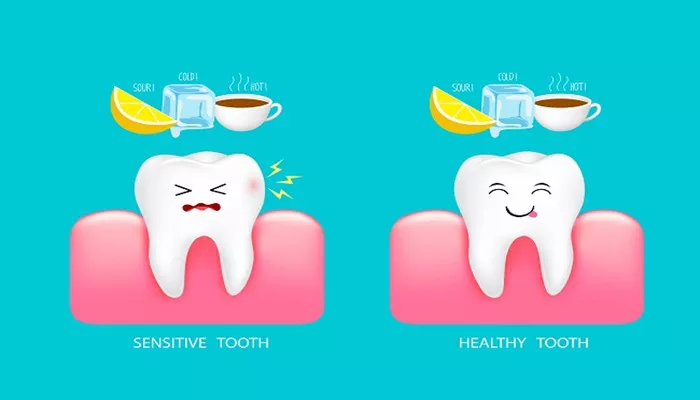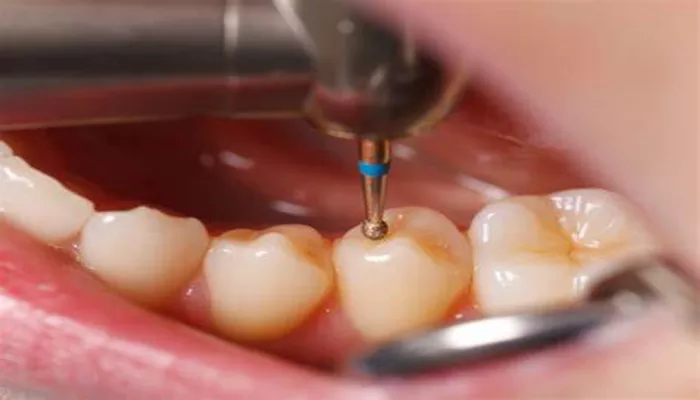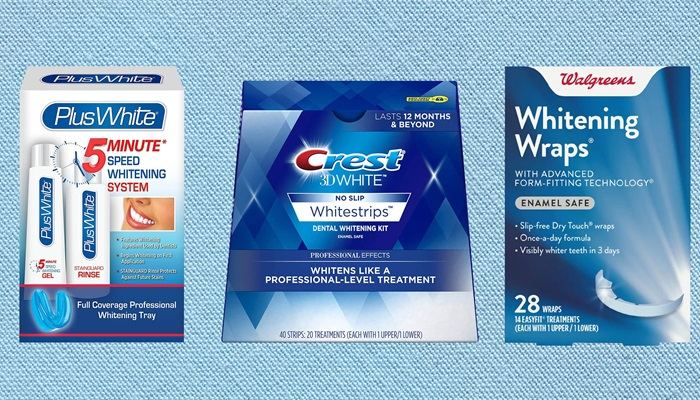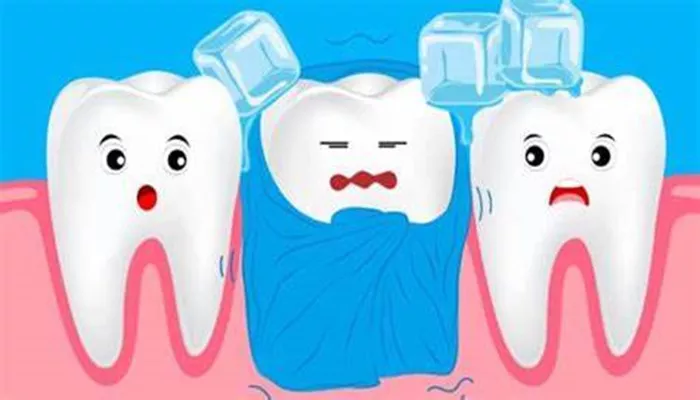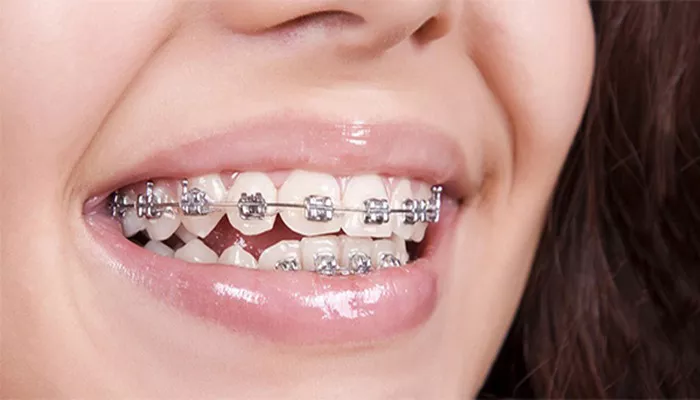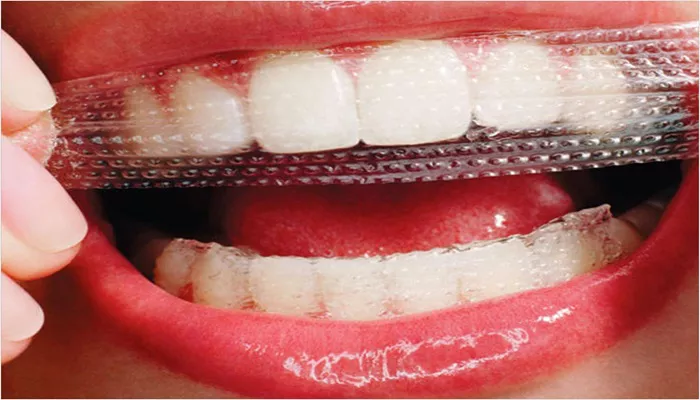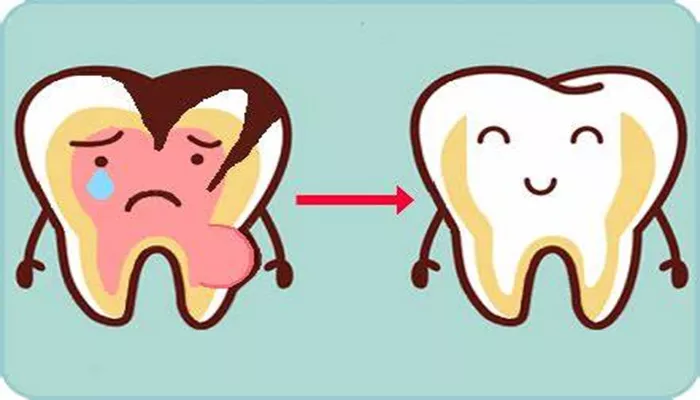Sensitive Teeth Symptoms
Recognizing the symptoms of sensitive teeth is the first step toward addressing the issue. Common signs include:
Sharp Pain with Temperature Changes: A sudden, sharp pain when consuming hot, cold, or sweet foods and beverages is a hallmark of tooth sensitivity.
Discomfort While Brushing or Flossing: Sensitive teeth may cause discomfort during routine oral hygiene activities.
Exposure to Air Triggers Pain: In some cases, breathing in cold air can elicit pain in sensitive teeth.
Localized Pain: Sensitivity is often localized to one or a few teeth, distinguishing it from generalized oral discomfort.
It’s crucial to note that these symptoms might overlap with other dental conditions, such as cavities or gum disease. Consulting a dentist is essential for an accurate diagnosis.
Sensitive Teeth Causes
Understanding the underlying causes of sensitive teeth helps in effective prevention and management. Here are the primary factors contributing to this condition:
1. Enamel Erosion
Tooth enamel is the protective outer layer of the tooth. When it wears down due to acidic foods, aggressive brushing, or age-related factors, the dentin underneath becomes exposed, leading to sensitivity.
2. Gum Recession
Gum recession, often caused by periodontal disease or improper brushing, exposes the tooth roots. Unlike enamel, the roots lack protection, making them vulnerable to sensitivity.
3. Dental Procedures
Teeth may become temporarily sensitive after professional cleanings, whitening treatments, or restorative dental work. This type of sensitivity typically resolves within a few weeks.
4. Tooth Decay or Cracks
Cavities, fractures, or cracks in teeth can expose the inner structures of the tooth, triggering sensitivity.
5. Bruxism (Teeth Grinding)
Grinding teeth at night can wear down enamel and increase tooth sensitivity over time.
6. Acidic Diet
Consuming acidic foods and beverages, such as citrus fruits, soda, and wine, can weaken enamel and exacerbate sensitivity.
Sensitive Teeth Remedies
Managing tooth sensitivity often starts with remedies that can be implemented at home or through over-the-counter products. These remedies include:
1. Use of Desensitizing Toothpaste
Specialized toothpastes containing potassium nitrate or stannous fluoride can help block pain signals from the tooth surface to the nerve.
2. Fluoride Treatments
Fluoride rinses or gels can strengthen enamel and reduce sensitivity. These are available both over-the-counter and through a dentist’s prescription.
3. Proper Oral Hygiene
Adopting a gentle yet thorough oral hygiene routine is crucial. Use a soft-bristled toothbrush and avoid aggressive brushing techniques.
4. Avoid Trigger Foods
Reducing the intake of acidic, sugary, or extremely hot and cold foods can minimize sensitivity flare-ups.
5. Maintain Hydration
Drinking water after consuming acidic foods or beverages helps neutralize the acids in your mouth.
6. Address Teeth Grinding
Using a mouthguard at night can prevent enamel erosion caused by bruxism.
Sensitive Teeth Treatment
If home remedies do not alleviate the discomfort, professional dental treatments may be necessary. Dentists offer several effective solutions:
1. Fluoride Varnishes
Dentists can apply concentrated fluoride varnishes to sensitive areas, helping to strengthen enamel and reduce pain.
2. Dental Bonding
Bonding involves applying a tooth-colored resin to exposed root surfaces or damaged enamel. This provides a protective barrier and minimizes sensitivity.
3. Gum Grafting
For severe gum recession, a gum graft procedure can cover exposed roots, significantly reducing sensitivity.
4. Root Canal Therapy
In cases where sensitivity is due to extensive decay or nerve exposure, a root canal may be performed to remove the damaged tissue and alleviate pain permanently.
5. Sealants
Dental sealants can be applied to the surface of teeth to protect against sensitivity caused by enamel erosion or minor cracks.
FAQs about Sensitive Teeth
1. Why are my teeth so sensitive all of a sudden?
Sudden tooth sensitivity can happen for several reasons, such as:
Enamel Erosion: Over time, acidic foods, beverages, or aggressive brushing can wear down enamel, exposing the dentin underneath.
Gum Recession: Receding gums expose the roots of teeth, which are not protected by enamel and are more sensitive to temperature changes or pressure.
Dental Procedures: Recent treatments like fillings, cleanings, or whitening can temporarily increase sensitivity.
Cracked or Damaged Teeth: A crack in a tooth can expose the nerve, leading to acute sensitivity.
Tooth Decay or Infection: Cavities or infections can lead to heightened sensitivity and pain.
If your sensitivity is sudden and persistent, consult your dentist to rule out underlying issues.
2. How to brush teeth if you have sensitive gums?
Brushing with sensitive gums requires care to avoid further irritation. Here’s how:
Use a Soft-Bristled Toothbrush: These are gentler on gums and teeth, reducing abrasion.
Opt for Sensitive Toothpaste: Formulated to soothe sensitivity, these pastes also help protect enamel.
Adopt a Gentle Technique: Brush using small, circular motions without applying excessive pressure.
Avoid Overbrushing: Brush twice daily for two minutes each time; overbrushing can cause gum recession and enamel wear.
Rinse with Warm Water: If cold water causes discomfort, use lukewarm water instead.
3. Why are my teeth sensitive next to my gums?
Sensitivity near the gums is often linked to the following:
Gum Recession: The gums pull away from teeth, exposing the root surface, which is more sensitive due to lack of enamel.
Plaque Buildup: Plaque and tartar near the gumline can irritate gums and cause sensitivity.
Gum Disease: Conditions like gingivitis or periodontitis can lead to inflamed, receding gums, increasing sensitivity.
Tooth Wear: Aggressive brushing or clenching and grinding can wear down enamel, especially near the gumline.
Dental Treatments: Cleaning or deep scaling can temporarily expose sensitive areas.
Maintaining proper oral hygiene and addressing gum health can help alleviate this issue.

